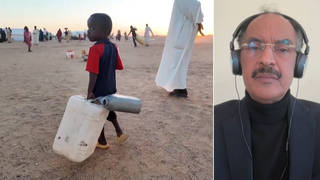Hi there,
For nearly 30 years, Democracy Now! has gone to where the silence is. Our reporting provides news you can’t find anywhere else and helps maintain an informed public, which is critical for a functioning democracy. Please donate today, so we can keep amplifying voices that refuse to be silent.
Every dollar makes a difference. Thank you so much!
Democracy Now!
Amy Goodman
Hi there,
For nearly 30 years, Democracy Now! has gone to where the silence is. Our reporting provides news you can’t find anywhere else and helps maintain an informed public, which is critical for a functioning democracy. Please donate today, so we can keep amplifying voices that refuse to be silent.
Every dollar makes a difference. Thank you so much!
Democracy Now!
Amy Goodman
Non-commercial news needs your support.
We rely on contributions from you, our viewers and listeners to do our work. If you visit us daily or weekly or even just once a month, now is a great time to make your monthly contribution.
Please do your part today.
HeadlinesMay 10, 2005
Marines Launch Large Offensive in Western Iraq
In western Iraq, U.S. Marines have launched what is being described as the largest US offensive since the invasion of Fallujah. The military claims it has already killed 100 people near the Syrian border. At least three Marines have died in the fighting. According to the Los Angeles Times, the Iraqi resistance has been well prepared for the U.S. attacks. Sandbag bunkers have been piled in front of homes. Fighters were strategically positioned on rooftops and balconies. Residents were seen flashing lights signaling the coming of the U.S. troops. Attacking Marines faced a barrage of mortars. In at least one town, Marines were involved in house-house combat. Regiment commander Col. Stephen Davis said “They’ve got seasoned fighters out here–this is a dedicated enemy that needs to be rooted out. That could take days, or weeks or months. We’ll stay here until it’s done.”
CIA Retains Control Of Iraq’s Intelligence Service
Meanwhile the CIA is refusing to hand over control of Iraq’s intelligence service to the newly elected Iraqi government. This according to a report by the Knight Ridder News Agency. Iraq’s secret police remains essentially an arm of the United States. The director was picked by the Bush administration, the agency is funded by the U.S. government and reports directly to the CIA. In addition the U.S. has barred the new government from looking at the sensitive national intelligence archives which are being stored inside the U.S. headquarters in Baghdad. One Iraqi politician told Knight Ridder “I prefer to call it the American Intelligence of Iraq, not the Iraqi Intelligence Service. If they insist on keeping it to themselves, we’ll have to form another one.” The U.S. has defended the set-up saying the measures are needed to protect Iraq’s secrets from being given to neighboring Iran.
U.S. To Spend $50M On Prison Expansion in Iraq
Meanwhile the Washington Post reports the U.S. plans to build more prisons in Iraq to accommodate the surging number of detainees. The U.S. is now holding just over 11,000 prisoners–twice the number it was holding six months ago. The U.S. plans to spend $50 million to expand three existing prison facilities and open a fourth.
New Questions Raised About UN Nominee John Bolton
On Capitol Hill, the Senate Foreign Relations Committee is preparing to vote Thursday on the nomination of John Bolton to become ambassador to the United Nations. However more questions have emerged about Bolton’s performance at the State Department where he served as under secretary of state for arms control. The Senators recently learned that Bolton was ordered two years ago not to deliver any speeches or testimony unless it was personally approved by Richard Armitage–the deputy secretary of state. This was because Secretary of State Colin Powell and Armitage felt Bolton had caused problems by inappropriately speaking out on several delicate issues. Meanwhile the CIA’s former deputy director — John McLaughlin — has confirmed that Bolton tried to oust a top CIA analyst from his post in a dispute over the threat posed by Cuba. McLaughlin said the incident marked the only time in his 32 years at the agency that he had seen a policy maker request a CIA analyst be transferred.
Mexico City Mayor Officially Announces Presidential Candidacy
In Mexico, the populist mayor of Mexico City Andres Manuel Lopez Obrador officially announced Monday that he will resign as mayor on July 31 in order to run for president. He plans to run on a platform of “more justice and less inequality.” Next year voters in Mexico will head to the polls to pick the replacement of Vicente Fox–who is barred under the constitution from seeking a third term.
Gov’t Drops Cases of 16-Year-Old “Would-Be Suicide Bombers”
In New York a 16-year-old girl — who the government accused of being a would-be suicide bomber — has returned to her high school in East Harlem. Six weeks ago federal officials detained two 16-year-old girls–one from Guinea and one from Bangladesh. At the time the government claimed they were a ” imminent threat to the security of the United States.” For six weeks the government said little about their detentions despite a public outcry. The case was cloaked in secrecy. Hearings were closed to the public. FBI comments were sealed. And attorneys were barred from disclosing government information. But it now appears the government had no case at all and that the girls posed no threat. The New York Times reports the government released the girl from Guinea and she returned to school on Friday. Meanwhile the Bangladeshi girl remains in detention–but for immigration reasons, not national security. An immigration judge has ordered her and her parents to be deported.
Most popular
- 1
- 2
- 3
- 4
Non-commercial news needs your support
Please do your part today.












Media Options